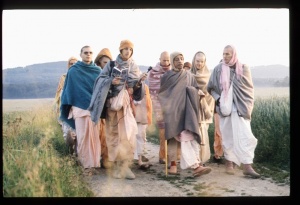CC Antya 1.139 (1975): Difference between revisions
(Vanibot #0027: CCMirror - Mirror CC's 1996 edition to form a basis for 1975) |
(Vanibot #0020: VersionCompareLinker - added a link to the Version Compare feature) |
||
| Line 2: | Line 2: | ||
<div style="float:left">'''[[Sri Caitanya-caritamrta (1975)|Śrī Caitanya-caritāmṛta (1975)]] - [[CC Antya (1975)|Antya-līlā]] - [[CC Antya 1 (1975)|Chapter 1: Śrīla Rūpa Gosvāmī's Second Meeting With the Lord]]'''</div> | <div style="float:left">'''[[Sri Caitanya-caritamrta (1975)|Śrī Caitanya-caritāmṛta (1975)]] - [[CC Antya (1975)|Antya-līlā]] - [[CC Antya 1 (1975)|Chapter 1: Śrīla Rūpa Gosvāmī's Second Meeting With the Lord]]'''</div> | ||
<div style="float:right">[[File:Go-previous.png|link=CC Antya 1.138 (1975)|Antya-līlā 1.138]] '''[[CC Antya 1.138 (1975)|Antya-līlā 1.138]] - [[CC Antya 1.140 (1975)|Antya-līlā 1.140]]''' [[File:Go-next.png|link=CC Antya 1.140 (1975)|Antya-līlā 1.140]]</div> | <div style="float:right">[[File:Go-previous.png|link=CC Antya 1.138 (1975)|Antya-līlā 1.138]] '''[[CC Antya 1.138 (1975)|Antya-līlā 1.138]] - [[CC Antya 1.140 (1975)|Antya-līlā 1.140]]''' [[File:Go-next.png|link=CC Antya 1.140 (1975)|Antya-līlā 1.140]]</div> | ||
{{CompareVersions|CC|Antya 1.139|CC 1975|CC 1996}} | |||
{{RandomImage}} | {{RandomImage}} | ||
==== TEXT 139 ==== | ==== TEXT 139 ==== | ||
| Line 12: | Line 11: | ||
:abhivyaktā mattaḥ prakṛti-laghu-rūpād api budhā | :abhivyaktā mattaḥ prakṛti-laghu-rūpād api budhā | ||
:vidhātrī siddhārthān hari-guṇa-mayī vaḥ kṛtir iyam | :vidhātrī siddhārthān hari-guṇa-mayī vaḥ kṛtir iyam | ||
:pulindenāpy agniḥ | :pulindenāpy agniḥ kimu samidham-unmathya janito | ||
:hiraṇya-śreṇīnām apaharati nāntaḥ-kaluṣatām | :hiraṇya-śreṇīnām apaharati nāntaḥ-kaluṣatām | ||
</div> | </div> | ||
| Line 20: | Line 19: | ||
<div class="synonyms"> | <div class="synonyms"> | ||
abhivyaktā—manifested; mattaḥ—from me; prakṛti—by nature; laghu-rūpāt—situated in a lower position; api—although; budhāḥ—O learned devotees; vidhātrī—which may bring about; siddha-arthān—all the objects of perfection; hari-guṇa-mayī—whose subject matter is the attributes of Kṛṣṇa; vaḥ—of you; kṛtiḥ—the poetic play known as Vidagdha-mādhava; iyam—this; pulindena—by the lowest class of men; api—although; agniḥ—a fire; | abhivyaktā—manifested; mattaḥ—from me; prakṛti—by nature; laghu-rūpāt—situated in a lower position; api—although; budhāḥ—O learned devotees; vidhātrī—which may bring about; siddha-arthān—all the objects of perfection; hari-guṇa-mayī—whose subject matter is the attributes of Kṛṣṇa; vaḥ—of you; kṛtiḥ—the poetic play known as Vidagdha-mādhava; iyam—this; pulindena—by the lowest class of men; api—although; agniḥ—a fire; kimu—whether; samidham—the wood; unmathya—rubbing; janitaḥ—produced; hiraṇya—of gold; śreṇīnām—of quantities; apaharati—vanquishes; na—not; antaḥ—inner; kaluṣatām—dirty things. | ||
</div> | </div> | ||
| Line 27: | Line 26: | ||
<div class="translation"> | <div class="translation"> | ||
"O learned devotees, I am by nature ignorant and low, yet even though it is from me that Vidagdha-mādhava has come, it is filled with descriptions of the transcendental attributes of the Supreme Personality of Godhead. Therefore, wiIl not such literature bring about the attainment of the highest goal of life? Although its wood may be ignited by a low-class ma, fire can nevertheless purify gold. Although I am very low by nature, this book may help cleanse the dirt from within the hearts of the golden devotees.' " | |||
</div> | </div> | ||
| Line 34: | Line 33: | ||
<div class="purport"> | <div class="purport"> | ||
This verse is Vidagdha-mādhava 1.6. | This verse is also from Vidagdha-mādhava (1.6). | ||
</div> | </div> | ||
Latest revision as of 20:08, 26 January 2020

A.C. Bhaktivedanta Swami Prabhupada
TEXT 139
- abhivyaktā mattaḥ prakṛti-laghu-rūpād api budhā
- vidhātrī siddhārthān hari-guṇa-mayī vaḥ kṛtir iyam
- pulindenāpy agniḥ kimu samidham-unmathya janito
- hiraṇya-śreṇīnām apaharati nāntaḥ-kaluṣatām
SYNONYMS
abhivyaktā—manifested; mattaḥ—from me; prakṛti—by nature; laghu-rūpāt—situated in a lower position; api—although; budhāḥ—O learned devotees; vidhātrī—which may bring about; siddha-arthān—all the objects of perfection; hari-guṇa-mayī—whose subject matter is the attributes of Kṛṣṇa; vaḥ—of you; kṛtiḥ—the poetic play known as Vidagdha-mādhava; iyam—this; pulindena—by the lowest class of men; api—although; agniḥ—a fire; kimu—whether; samidham—the wood; unmathya—rubbing; janitaḥ—produced; hiraṇya—of gold; śreṇīnām—of quantities; apaharati—vanquishes; na—not; antaḥ—inner; kaluṣatām—dirty things.
TRANSLATION
"O learned devotees, I am by nature ignorant and low, yet even though it is from me that Vidagdha-mādhava has come, it is filled with descriptions of the transcendental attributes of the Supreme Personality of Godhead. Therefore, wiIl not such literature bring about the attainment of the highest goal of life? Although its wood may be ignited by a low-class ma, fire can nevertheless purify gold. Although I am very low by nature, this book may help cleanse the dirt from within the hearts of the golden devotees.' "
PURPORT
This verse is also from Vidagdha-mādhava (1.6).